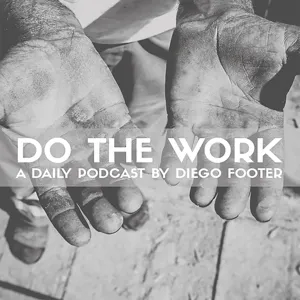Podcast Summary
Cal Newport Renovates His Studio and Updates His Podcast Format: Cal Newport is revamping his Deep Questions podcast with new episode types, including Q&A sessions, deep dives, and profiles in depth, to offer more engaging and varied content for listeners.
Cal Newport, the host of the Deep Questions podcast, is renovating his studio to accommodate guests and is considering evolving the format of his show. He plans to introduce new episode types including Q&A sessions where voice calls and red questions are combined, deep dives where guests join him to explore topics in depth, and profiles in depth where he interviews people living interesting deep lives. These changes aim to provide more engaging and varied content for listeners. Newport is open to feedback and encourages listeners to share their thoughts at interesting@calnewport.com. Additionally, he invites listeners to sign up for his email list.
Preparation and productivity in time management: Effectively manage time by dedicating blocks to preparation (input) and productivity (output) like Hercules preparing for battle and slaying the Hydra.
Effective time management involves both preparation (input) and productivity (output) during specific blocks of time. Using the analogy of Hercules preparing for battle with the Hydra, Cal Newport explained that one could dedicate a time block to preparing for the battle (input), such as sharpening a sword, or to actually producing an output, like slaying the Hydra itself. Both are important for maximizing productivity. Additionally, Cal mentioned his weekly essay and podcast, which cover productivity topics in depth. He encouraged listeners to sign up for his email list to stay updated on new content. Cal also took a brief moment to promote Magic Spoon, a cereal brand that offers guilt-free, high-protein, and low-carb cereals. With new limited-edition flavors and a customizable variety box, Magic Spoon caters to various tastes while maintaining health benefits. Listeners were encouraged to visit magic spoon.com/Cal and use the promo code "Cal" for a $5 discount on their order. Magic Spoon's commitment to customer satisfaction is evident in their 100% happiness guarantee, which allows for full refunds if customers are not satisfied with their purchase. So whether you're looking for a delicious and healthy breakfast option or productivity advice, remember to check out Cal Newport's content and Magic Spoon cereal.
Collaborate with your future self to create a time-block plan: Work with your future self to make decisions and plan tasks beforehand to reduce cognitive load and decision fatigue, rather than relying solely on time blocking for productivity
Time blocking can increase productivity by helping us focus and eliminate decision-making in the moment. However, it may not be effective for tasks where the how is not well defined. Instead, consider collaborating with your future self by creating a time-block plan together. This way, you can take decisions and figure out what to work on beforehand, reducing cognitive load and decision fatigue. Avoid using time blocking as a means of coercion towards your future self, as discipline is a separate issue. Time management tools are designed to help us manage our time efficiently, not to enforce discipline.
Effective time management requires planning and discipline: Plan tasks with time block planner, prioritize roles with weekly planning, and maintain self-discipline to execute tasks
Effective time management involves both planning and discipline. While time block planning and scheduling systems can help organize your energy and prioritize tasks, the actual execution of those tasks requires self-discipline. For example, it's important to remember to sharpen your sword (i.e., take care of necessary tasks) before going into battle (i.e., tackling larger projects), but you don't need to write down the obvious tasks you won't forget. Regarding weekly planning, it can be helpful to allocate specific hours to major roles in your professional career, such as teaching, research, and service in academia. However, it can be challenging to keep track of these hours over the course of the week. One suggestion is to use a time block planner for daily tasks while also keeping an eye on the bigger picture of your weekly role allocation. By regularly reviewing your time block plans and adjusting as needed, you can work towards meeting your targets and achieving a better balance between your various professional roles.
Setting realistic targets and managing time efficiently: Academics can effectively manage their time by setting realistic goals, scheduling tasks on a calendar, and eliminating inefficient tasks to create a balanced workload and increase productivity.
Effective time management for academics involves setting realistic targets based on current role responsibilities, preallocating time on the calendar for different roles, and making adjustments when necessary to fit all tasks within available time. This process includes finding ways to make work more efficient and eliminating unnecessary tasks when needed. By following these steps, academics can create a balanced workload and maximize productivity.
Effective Time Management: Prioritizing Important Tasks: Prioritize tasks based on importance, experiment with schedules, and focus on completing critical tasks first to manage time effectively and reduce feelings of being overwhelmed.
Effective time management involves distinguishing between important and less important tasks, and prioritizing accordingly. The speaker, who is a research scientist, shares her experience of successfully implementing weekly and daily planning, but struggling with quarterly planning due to an overwhelming number of projects and obligations. Cal Newport offers advice on this issue, suggesting that it's essential to recognize that some tasks are more critical than others and to focus on completing those first. The speaker also emphasizes the importance of experimentation and adjusting schedules as needed. In essence, the key takeaway is that prioritizing tasks based on their importance and making a conscious effort to complete the most critical ones first can help manage time effectively and reduce feelings of being overwhelmed.
Prioritize important but non-urgent tasks: Focus on class A shareholders for efficient time management and professional growth. Identify and communicate limits to avoid chronic overload.
In both academic and professional settings, it's essential to prioritize important but non-urgent tasks, even if they don't come with a hard deadline. These tasks, often referred to as "class A shareholders," should be given priority in your quarterly and weekly plans. By doing so, you create a back pressure that forces you to be more efficient with other tasks or obligations, allowing you to say no when necessary. This approach not only helps manage your time effectively but also keeps you focused on the projects that contribute most to your professional success. Remember, it's crucial to identify and communicate your limits to avoid chronic overload. For more insights on living a deeper life, check out Optimize, a subscription service offering philosopher notes on over 600 nonfiction books.
Boost productivity and convenience with Optimize and Stamps.com: Optimize offers knowledge, action, and inspiration, while Stamps.com simplifies shipping and saves time
Optimize and Stamps.com can significantly improve productivity and convenience in different aspects of life. Optimize, through its insightful book summaries, daily wisdom, and master classes, offers a platform for deepening knowledge and putting it into action. Stamps.com, on the other hand, simplifies the process of shipping by bringing US Postal Service and UPS services online, offering discounts, and eliminating the need to physically visit a post office. For those struggling with social needs during the pandemic, Cal Newport's Digital Minimalism can provide guidance on decluttering digital life, but fulfilling social needs may require creative solutions, such as virtual meetups or hobbies.
Intentional use of technology for social connections: Focus on specific digital tools for social connections, define their purpose, and set boundaries to avoid distractions.
It's important to intentionally use digital tools to enhance social connections, rather than mindlessly consuming technology. The digital minimalism approach suggests recognizing the specific ways technology supports your social life and focusing on those uses, while limiting or avoiding other distractions. By defining the purpose for using specific digital platforms, such as a Discord server for a TV show, and setting boundaries around their use, one can reap the benefits of social connection without the negative side effects of excessive technology use. It's essential to remember that sociality, both digital and analog, is an important aspect of life that requires intentional focus and attention.
Investing in Real-World Social Connections: Maximize productivity by prioritizing real-world social connections, join groups, have regular outings, and make time for conversations.
Social connections are essential and cannot be fully replaced by digital means. It's crucial to invest time and energy into building and maintaining relationships with people in the real world. This may involve joining groups, having regular outings, or simply making time for conversations. Sociality should be a priority, especially for those living alone after college. Unexpected free time, even if short, should be utilized intentionally to avoid distractions and maximize productivity.
Managing distractions and free time for productivity: Schedule and batch distractions or use unexpected free time for deep breaks to maintain focus and productivity
Managing distractions and unexpected free time during work hours is crucial for maintaining focus and productivity. Most people tend to fall back on distractions like social media or constant communication through email and Slack, which can lead to severe cognitive contact shifts and fatigue. Instead, it's recommended to schedule and batch these activities, or use the unexpected free time for deep breaks that don't involve emotional saliency or unresolved needs from others. Deep breaks can include activities like reading, walking, or engaging in hobbies that bring enjoyment and relaxation. By doing so, we can make the most of our workday and fully disconnect once it's completed.






